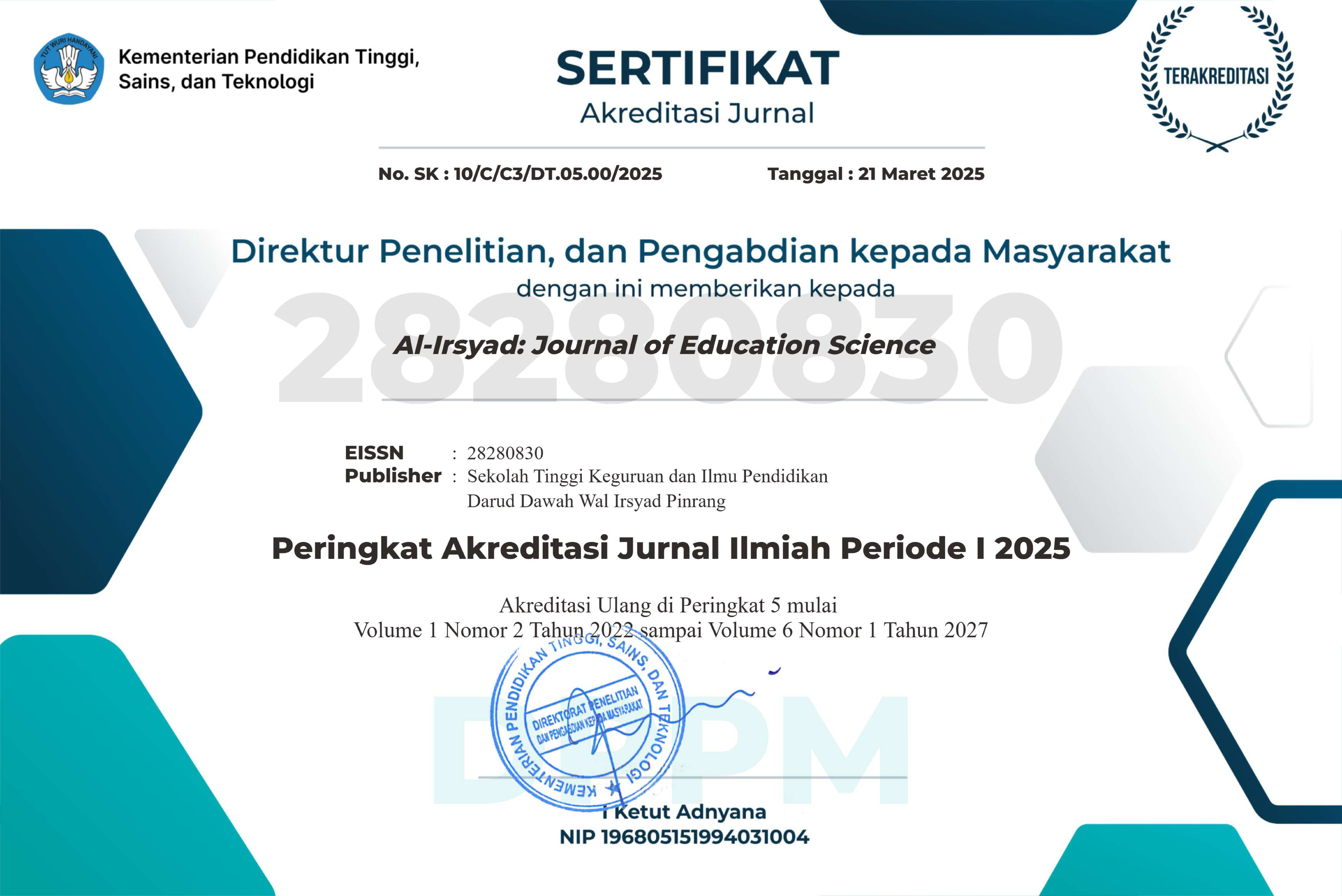A CHAPTER REVIEW: WRITING MATERIAL FOR ESOL (ENGLISH FOR SPEAKERS OF OTHER LANGUAGES)
(The Routledge Handbook of Materials Development for Language Teaching-Routledge)
DOI:
https://doi.org/10.58917/aijes.v2i1.46Kata Kunci:
ESOL, Chapter Review, Writing MaterialAbstrak
This article's objective is to review Chapter 23 of Naeema B.Hann’s script in book "the Routledge of materials Development for Language Teaching-Routledge," which was edited and compiled in 2022 by Julie Norton and Heather Buchanandi. Starting with the development of ESOL, this is nearly identical to teaching ESL and only differs in terms of the students’ home countries and languages. The author raises the issue of how adults learn the language they need, the context of language use and ESOL learning and the approaches used in teaching language in ESOL classes. Reviewer notes various benefits in this work, including the fact that the author of this chapter goes into great detail to describe the origins of ESOL in the context of teaching English. This development ultimately generated a discussion about how teachers might create pedagogical materials that cater to students' needs so that these resources can be effective in students' lives both in the workplace and in social settings.
Referensi
Baynham, M. (2007). ESOL: Effective teaching and learning.
Bourdieu, P. (1977). The economics of linguistic exchanges. Social Science Information, 16(6), 645–668.
Dollah, S., & Mustaqimah. (2016). The attitude of hotel department students towards learning English in relation to their learning strategies and achievement in Indonesian context. Asian EFL Journal, 95. https://www.asian-efl-journal.com/monthly-editions-new/volume-95-october-2016-teaching-article/
Group, D. F. (2016). A transdisciplinary framework for SLA in a multilingual world. The Modern Language Journal, 100(S1), 19–47.
Hann, N. (2017). Beyond Pastoral: The Role of Family in Second Language Learning Experiences of Adult. English Scholarship Beyong Borders, 2.
Hann, N. B. (2012). Factors Supporting Progress of ESOL Learners in Speaking Skills. Unpublished Doctoral Dissertation. Leeds Metropolitan University. Leeds.
Hann, N. B. (2022). Writing materials for ESOL. In The Routledge Handbook of Materials Development for Language Teaching (pp. 334–346). Routledge.
Humaeroah, H., Sardi, A., & Ermawati, E. (2023). Teacher Perspective: Managing Students’ Behavior Problem in Teaching English at Primary School. IDEAS: Journal on English Language Teaching and Learning, Linguistics and Literature, 10(2), 2113-2121.
Idman, M., & Mustaqimah, M. (2021). Teaching Indonesian-English Combined Task to Improve Students’ Skills in Writing English Sentences. LETS: Journal of Linguistics and English Teaching Studies, 3(1), 1–13.
Kalsum, K., Rauf, F. A., & Sardi, A. (2023). Implementation of Reading-Log to Increase Students’ Interest on Literacy at Islamic Boarding School. IDEAS: Journal on English Language Teaching and Learning, Linguistics and Literature, 10(2), 1887-1898.
Krupska, M., & Klein, C. L. (1995). Demystifying Dyslexia: Raising awareness and developing support for dyslexic young people and adults. London Language & Literacy Unit.
Marsden, E., & Kasprowicz, R. (2017). Foreign language educators’ exposure to research: Reported experiences, exposure via citations, and a proposal for action. The Modern Language Journal, 101(4), 613–642.
Mishan, F. (2015). Materials development for TESOL. Edinburgh University Press.
Rosenberg, S. (2007). A critical history of ESOL in the UK, 1870-2006. National Institute of Adult Continuing Education.
Sardi, A., Haryanto, A., & Weda, S. (2017). The Distinct types of diction used by the efl teachers in the classroom interaction. International Journal Of Science and Research (IJSR), 6(3), 1061-1066.
Sardi, A., JN, M. F., Walid, A., & Ahmad, A. K. (2022). An Analysis Of Difficulties In Online English Learning Experienced By The Efl Teacher. Inspiring: English Education Journal, 5(2), 144-154.
Tang, M. M., & Nurkidam, A. (2021). The Use of Scramble Game in Improving Students’ Grammar Achievement. LETS: Journal of Linguistics and English Teaching Studies, 2(2), 73–80.
Timmis, I. (2015). Corpus linguistics for ELT: Research and practice. Routledge.
Tomlinson, B. (2003). Developing materials for language teaching. A&C Black.
Tyers, A., & Lightfoot, A. (2018). Using mobile to create low-cost, high-quality language learning opportunities: Lessons from india and bangladesh. In International Perspectives on Teaching English in Difficult Circumstances (pp. 109–130). Springer.
Wolfram, W. (2014). Integrating language variation into TESOL: Challenges from English globalization. In Englishes in multilingual contexts (pp. 15–31). Springer.
Unduhan
Diterbitkan
Cara Mengutip
Terbitan
Bagian
Lisensi
Hak Cipta (c) 2023 Mustaqimah Muh Tang, Muhajirah Idman, Andi Tarbiyah Hasan

Artikel ini berlisensi Creative Commons Attribution 4.0 International License.























